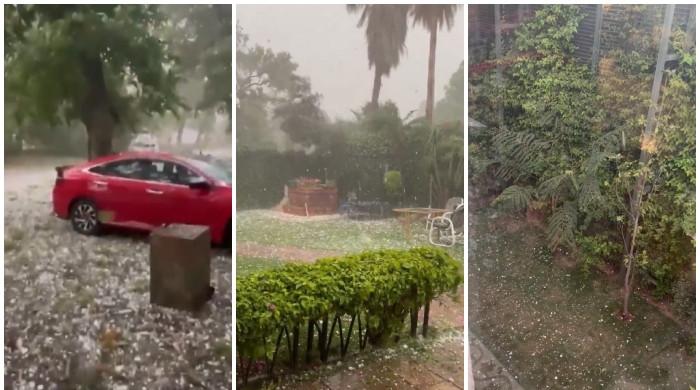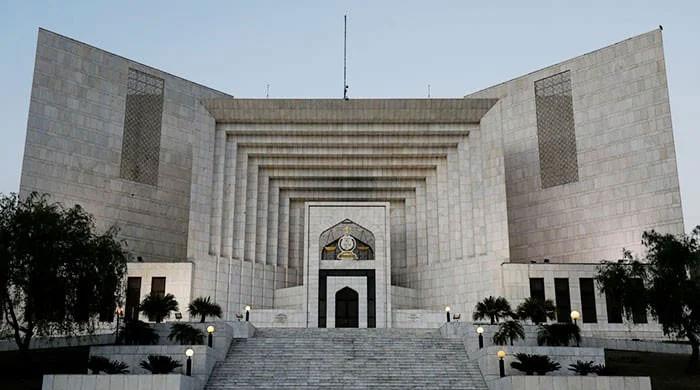Pakistan welcomes Taliban's 'willingness to reduce violence' in Afghanistan
FM Qureshi says Taliban's willingness is a 'step towards a peace agreement'
January 16, 2020

WASHINGTON/ISLAMABAD: Foreign Minister Shah Mahmood Qureshi said Thursday the Taliban had shown a "willingness to reduce violence" in Afghanistan, welcoming the prospect of a peace agreement that sees peace prevail in the war-torn country.
"Today, a positive development has surfaced [regarding the Afghan peace process]," said the foreign minister in a video message. "The Taliban have expressed their willingness to the demand of reduction in violence. In my opinion, this is a step towards a peace agreement," he added.
Read more: FM Qureshi arrives in Washington for Middle East peace mission
Qureshi said Pakistan had played a responsible part in ensuring peace prevailed in the region. He said Islamabad wished for peace to prevail in Afghanistan and Pakistan as well.
Taliban offer ceasefire to US: international media
AFP adds: Two insurgent sources said the Taliban had offered a ceasefire to the US, a move that could allow for the resumption of talks seeking a deal for Washington to withdraw troops from Afghanistan. Both countries have been fighting a war for the past 18 years that has seen thousands killed, injured and displaced in the country.
After nearly two decades of fighting, Washington wants to withdraw US troops from the country but not without security guarantees. For weeks it has been calling on the Taliban to reduce violence, posing it as a condition for resuming formal negotiations on an agreement that would see US troops begin to leave the country.
"It is an offer for a ceasefire either for seven or 10 days," a senior Taliban official who requested anonymity told AFP, adding that the offer was made to US negotiators in Doha.
"It has been finalised and given to the Americans. It is going to pave the way for an agreement."
A second insurgent source confirmed to the AFP that the offer had been handed to the US.
The Taliban have yet to release an official statement and Washington has not said whether it has received any offer from the insurgents or what its response will be.
The Taliban and the US had been negotiating the deal for a year and were on the brink of an announcement in September 2019 when US President Donald Trump abruptly declared the process "dead", citing Taliban violence.
Talks were later restarted between the two sides in December in Qatar but were paused again following an attack near the Bagram military base in Afghanistan, which is run by the US.
"Two months have passed with no major Taliban attacks in any urban zone. That pause in attacks on cities is unprecedented over the last dozen years."
On Saturday, two Americans were killed in a Taliban-claimed bomb blast targeting a US forces vehicle in southern Kandahar.
If accepted by the Americans, the insurgents' offer could see the negotiations begin again.
The International Crisis Group's senior consultant, Graeme Smith, called the reports of a temporary ceasefire a "positive signal", saying a recent reduction of attacks in urban centres has added weight to the process.
"The Taliban have been sending an even bigger message with their actions in recent months. Two months have passed with no major Taliban attacks in any urban zone. That pause in attacks on cities is unprecedented over the last dozen years," said Smith.
The Taliban have only observed one ceasefire in their nearly two-decade fight with the US, when the insurgents agreed to a brief three-day truce in June 2018 to mark Eid, the end of the fasting month of Ramazan.
It saw Taliban fighters celebrating with ordinary Afghans in the streets, sharing ice creams and posing for selfies, raising hopes of a post-conflict Afghanistan.
Many analysts argued that the ceasefire proved the Taliban had widespread control over their rank and file fighters — although it was only with Afghan forces, not the US.
The Taliban have until now refused to negotiate with the Afghan government, which they consider an illegitimate regime, raising fears that fighting will continue regardless of any deal ironed out with the Americans.












